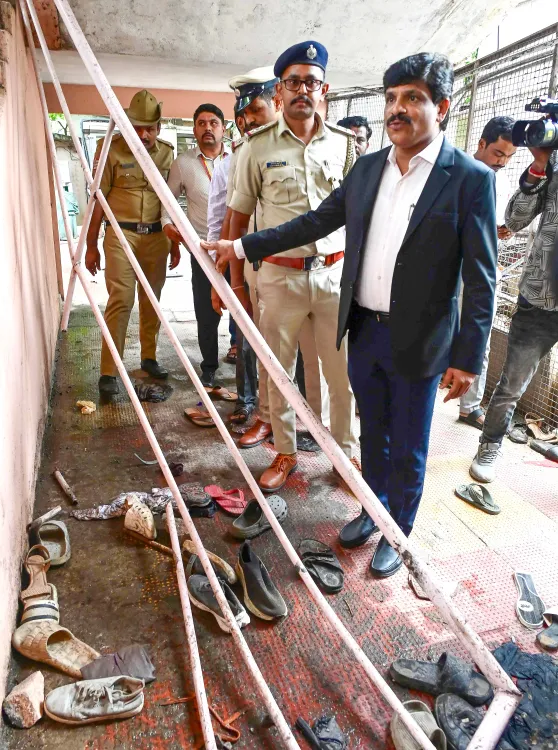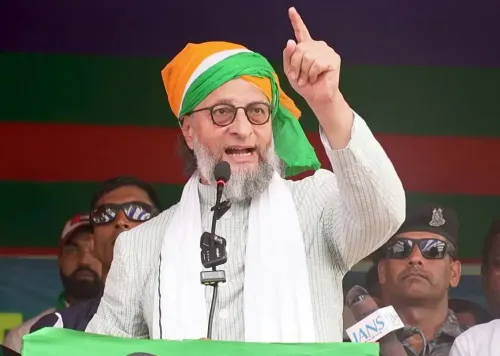Are Police Suspensions Over Stampede Fueling Tensions Between IAS and IPS Officers in Karnataka?

Synopsis
Key Takeaways
- Suspension of police officers has caused friction between IAS and IPS.
- Concerns were raised regarding security during the RCB celebration.
- IPS officers feel targeted while IAS officers are unpunished.
- This internal conflict may affect governance in Karnataka.
- Effective management of this situation is crucial for the state government.
Bengaluru, June 10 (NationPress) - The recent suspension of five police officers, including three senior IPS officials, by the state government in relation to the tragic June 4 stampede at Chinnaswamy Stadium—which resulted in 11 fatalities during the Royal Challengers Bengaluru (RCB) victory celebration—has ignited a cold war between IAS and IPS officers in Karnataka.
Reportedly, the IPS officers are dissatisfied with the harsh measures taken against them, particularly since IAS officers—who allegedly approved the victory celebrations at Vidhana Soudha despite explicit warnings from the police—remain unpunished.
Sources suggest that this internal conflict has given rise to a letter from the Deputy Commissioner of Police (DCP), Vidhana Soudha Division, Bengaluru.
This letter cautioned against conducting the event at Vidhana Soudha, citing security risks and overcrowding issues, while the state government emphasizes the Police Department’s failures concerning the stampede at Chinnaswamy Stadium.
Furthermore, it has come to light that the contract for the event at Vidhana Soudha was awarded to a close relative of a currently serving IAS officer, intensifying the rift.
The Indian Police Service Association has reached out to Chief Minister Siddaramaiah, urging the withdrawal of the suspension orders.
Many IPS members are also unhappy with Chief Minister Siddaramaiah's public announcement of the suspensions during a press conference after the incident.
Despite issuing warnings regarding the event at Vidhana Soudha and their best efforts at Chinnaswamy Stadium, IPS officers feel they were unfairly targeted while the actions of IAS officers were overlooked.
This issue is anticipated to pose a considerable challenge for the state government in the near future.
It’s worth noting that in response to communications from the Karnataka State Cricket Association and the Under Secretary of the Department of Personnel and Administrative Reforms (DPAR) regarding the organization of a felicitation event at the grand steps of Vidhana Soudha, DCP M.N. Karibasavana Gowda issued a warning in his three-page reply.
The letter, dated June 4, was directed to the Chief Secretary of DPAR. In it, the DCP underscored the potential influx of lakhs of RCB supporters and the challenges in providing adequate security due to insufficient personnel and officers.
Notably, Karnataka Chief Minister Siddaramaiah announced the suspension of five senior police officers, including the Bengaluru Police Commissioner and DCP (Central Division), following the stampede at Chinnaswamy Stadium.
The suspension order identified B. Dayananda, IPS, Additional Director General and Commissioner of Police, Bengaluru City; Vikash Kumar Vikash, IPS, Inspector General and Additional Commissioner of Police, West, Bengaluru City; Shekar H Tekkannavar, IPS, Deputy Commissioner of Police, Central Division, Bengaluru City; C Balakrishna, Assistant Commissioner of Police, Cubbon Park, Bengaluru; and A. K. Girish, Police Inspector, Cubbon Park Police Station, Bengaluru, for significant dereliction of duty.
Senior IPS officer Vikash Kumar has approached the Central Administrative Tribunal (CAT) to contest the suspension order.
Experts caution that if the state government does not manage this internal strife effectively, it could have serious repercussions for governance in the state.









